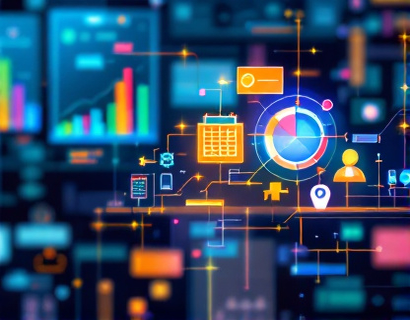Transforming Education with AI-Powered Learning Platforms: Ensuring Safe Exploration and Expert Knowledge Access
The integration of artificial intelligence in educational platforms has opened new avenues for learning and exploration, particularly in specialized fields such as integration services and industry knowledge. These AI-powered tools are designed to provide students and educators with accurate, verified, and expert-level information in a secure and interactive environment. This article delves into the specialized insights offered by such platforms, focusing on how they integrate services and ensure safe and effective use by students and educators.
AI-Driven Educational Platforms: A New Era of Learning
The advent of AI-driven educational platforms marks a significant shift in how knowledge is disseminated and accessed. These platforms leverage advanced algorithms and natural language processing to create interactive and personalized learning experiences. For students exploring complex topics like integration services, these platforms offer a gateway to expert insights that would otherwise be difficult to obtain. The primary goal is to create a safe and informative space where learners can engage with specialized content without compromising on security or accuracy.
Specialized Insights Through AI Chat Interfaces
One of the most innovative features of these platforms is the AI chat interface. This interface allows users to interact in real-time, asking questions and receiving detailed responses from AI systems trained on vast databases of industry knowledge. The chat interface is designed to mimic human-like conversation, making the learning process more engaging and intuitive. For instance, a student asking about the latest trends in integration services can receive up-to-date information, complete with examples and case studies, all presented in a clear and understandable manner.
Content Verification and Accuracy
A critical aspect of these platforms is the emphasis on content verification. In an era where misinformation can spread rapidly, ensuring that the information provided is accurate and reliable is paramount. The AI systems used in these platforms are trained on verified sources and continuously updated to reflect the latest developments in the field. This ensures that students and educators can trust the information they receive, making it an invaluable resource for learning and research.
Ensuring Safety for Young Learners
Safety is a top priority when it comes to educational platforms, especially those targeted at children and students. These AI-powered platforms implement robust security measures to create a safe environment for young learners. Content is strictly monitored and filtered to prevent any inappropriate or harmful material from being accessed. Additionally, the chat interface is designed to be child-friendly, using simple language and avoiding complex jargon that might confuse younger users. This makes the platform accessible and beneficial for students of all ages.
Child-Version Capability
To further enhance safety, many of these platforms offer a child version, tailored specifically for younger audiences. This version simplifies the language and presents information in a more engaging and visual format, suitable for children. The child version also includes parental controls and monitoring tools, allowing parents to oversee their child's learning activities and ensure they are using the platform safely and effectively.
Expert Knowledge Access: A Key Feature
One of the most significant advantages of AI-powered learning platforms is the easy access they provide to expert knowledge. These platforms connect users with industry experts and professionals who contribute to the database of information. This means that students and educators can gain insights from individuals with real-world experience and expertise, enriching the learning process. The AI chat interface facilitates this by allowing users to ask specific questions and receive detailed, expert-level answers.
Interactive Learning Experiences
The interactive nature of these platforms enhances the learning experience significantly. Users can engage in discussions, participate in virtual workshops, and access interactive tutorials and simulations. For example, a student learning about integration services can simulate real-world scenarios, apply theoretical knowledge in practical settings, and receive immediate feedback on their performance. This hands-on approach not only makes learning more engaging but also helps in better retention of information.
Integration Services: A Focused Area of Expertise
Integration services, which involve combining different software systems to work together seamlessly, is a complex and rapidly evolving field. AI-powered educational platforms offer specialized insights into this area, helping students and educators stay updated with the latest trends and technologies. The platform can cover a wide range of topics, from basic concepts and terminology to advanced techniques and best practices.
Comprehensive Coverage of Integration Concepts
The platform provides a comprehensive overview of integration services, starting from the fundamentals. Users can learn about the different types of integrations, such as API integrations, middleware, and data integration. Each topic is explained in detail, with examples and practical applications to illustrate key concepts. This ensures that learners have a solid foundation before delving into more complex subjects.
Stay Updated with Industry Trends
The field of integration services is constantly evolving, with new technologies and methodologies emerging regularly. AI-powered platforms keep users informed about these developments by regularly updating their databases with the latest research, news, and industry reports. This ensures that students and educators have access to current and relevant information, enabling them to stay ahead in their respective fields.
Enhancing Collaboration and Communication
Beyond providing expert knowledge, these platforms also facilitate collaboration and communication among users. The AI chat interface allows students and educators to connect with each other, form study groups, and collaborate on projects. This fosters a sense of community and shared learning, which is essential for personal and academic growth. Additionally, the platform can integrate with other educational tools and resources, creating a comprehensive ecosystem for learning.
Real-Time Support and Feedback
Another significant benefit is the real-time support and feedback mechanism. Students can get immediate answers to their questions, and educators can provide timely feedback on assignments and projects. This instant interaction not only enhances the learning experience but also helps in identifying and addressing knowledge gaps quickly. The AI chat interface can also suggest additional resources or suggest further reading based on the user's queries, making the learning process more dynamic and personalized.
Future-Proofing Education with AI
The integration of AI in educational platforms is not just a temporary trend but a step towards future-proofing education. As technology continues to advance, the role of AI in enhancing learning experiences will only grow. These platforms serve as a blueprint for how AI can be harnessed to create safe, informative, and interactive learning environments. By focusing on specialized insights and expert knowledge, they ensure that students and educators are well-equipped to navigate the complexities of modern integration services and beyond.
Conclusion
In conclusion, AI-powered learning platforms offer a revolutionary approach to education, particularly in specialized fields like integration services. By providing accurate, verified content in a safe and interactive environment, these platforms empower students and educators to explore and learn effectively. The emphasis on safety, especially for young learners, and the access to expert knowledge make these platforms invaluable resources in the digital age. As technology continues to evolve, the potential for AI to transform education remains vast, promising a future where learning is more accessible, engaging, and effective.











































